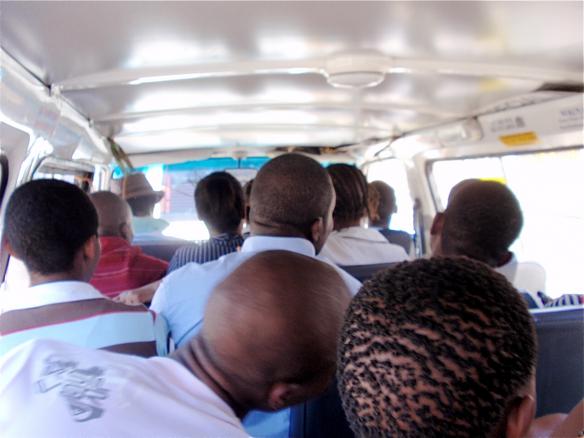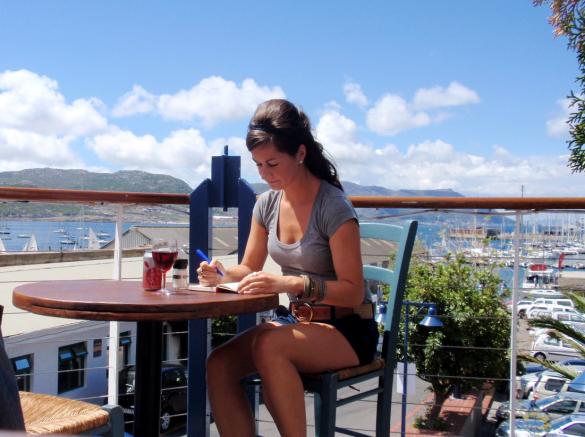It has been a month since settling in as a 24-year-old American girl living in Cape Town, and the days have gone by in a lull of routine living, punctuated with interludes of adventure.
Without a car and lacking the budget for cab fare, I have attempted to tackle the feat of the public transportation system. The white locals I’ve met say I’m crazy, arguing that young men don’t even ride the third-class transport. But in my ongoing quest to be a “citizen of the world,” I remained unconvinced of their warnings. My experience with, what is locally referred to as, the “black taxi” had for weeks been limited to short distances between suburbs– but on Friday I decided to catch a ride to the city.

 Cape Town’s local transportation
Cape Town’s local transportation
The frequency of the black taxi is unparalleled. Basically, if you snap your fingers one will appear on the curb in front of you. Walking along the main road, it is a quick nod-of-the-head transaction with the driver before I’m climbing aboard a packed 12-person van. One white grape in a box of raisins, I squeeze in between two of my sisters and prepare for a race to the finish.
The 20-minute ride is an endless game of red-light-green-light as multiple mini-buses compete for the leading spot and in turn, win the customer waiting on the side walk. Dropped-off passengers are practically pushed out of a still-moving vehicle and quickly replaced with an assertive pedestrian. Stoplights become a suggestion and stop signs become nonexistent.
Surviving the go-cart race, we arrive at Cape Town station and it seems as though every mini-bus I’ve ever seen is parked in the terminal. Hundreds of black taxis are honking and yelling, arriving and departing from areas of Cape Town I’ve never heard of. Remembering the warnings of locals and trying to forget Cape Town’s crime statistics, I attempt to put on a confident face. I get out of the van with a steady foot, but for the first time since arriving in the country, I feel afraid. “Nervous-laughter-I-really-screwed-up-this-time” afraid.
I’m in a make-shift parking garage several stories above road-level and the so-called city we arrived in is nowhere in sight. In each direction I turn, I can see only a sea of taxis, their entrepreneurial drivers and the weathered and worn passengers I arrived with. It goes without saying, there is no sign of security or authority amidst the chaos. I start walking– if only to try and look like I can’t be messed with. I pass boys selling ice cream out of cardboard boxes, women carrying fake hair for braiding, and men making discrete exchanges into each other’s pockets.
When I reach a taxi-free clearing I can see a barbed-wire, wooden walkway in the distance, and stairs leading down to a main road. At this point, I will welcome anything that remotely resembles an escape from the wet lips of loitering men and the icy glares of wild-haired women. But if that were the end, it would be too easy.

 American girl in Cape Town
American girl in Cape Town
Exiting the transit area, I’m herded onto a narrow walkway lined with tarp tents and make-shift booths. What I come to later find out is the home of Cape Town’s black market. These are the people who aren’t allowed to sell their goods on the street or even in the tourist areas and are reduced to the slim chance of selling a purse or scarf to their neighbor. If the police cared enough to walk up the causeway and enforce the commerce laws, it would be a circus of high-flying soda bottles, chips and candy in an attempt for the vendors to pack everything up and make a run for it.
As I walk through the shanty market, I make no attempt to avert my eyes. I absorb sights I’ve never seen before, smells I didn’t know existed and the chaotic sounds of business deals that have life on the line. It is like no other market I have been to– there are no fruits and vegetables or fresh fish, no woven tapestries or carved cutlery– it’s the attempt of Cape Town’s poorest citizens to feed a family of twelve, put a couple kids through school and maybe fix the roof before winter arrives. Then there’s the hard stuff– the boys facing the wall melting rock on spoons, and the girls prowling the tents in low-cut tops and sequined miniskirts. It is a marketplace of another day’s survival.
I bump and push my way through the crowd, carefully watching where I step and keeping a firm fist on the zipper of my bag. Considering the scene around me, the beckons of bored observers, and the fact I’m completely by myself, I push the “adventure” side out of my mind and focus on getting the “bleep” out of there. No more than 40 yards later, I reach the stairs leading down to the main road, and I’m relieved to find it’s exactly where I want to be. In that moment, after 10 minutes of wide-eyed, heart-thumping, sweaty fear, “survival” is a relative term– by no means black or white.